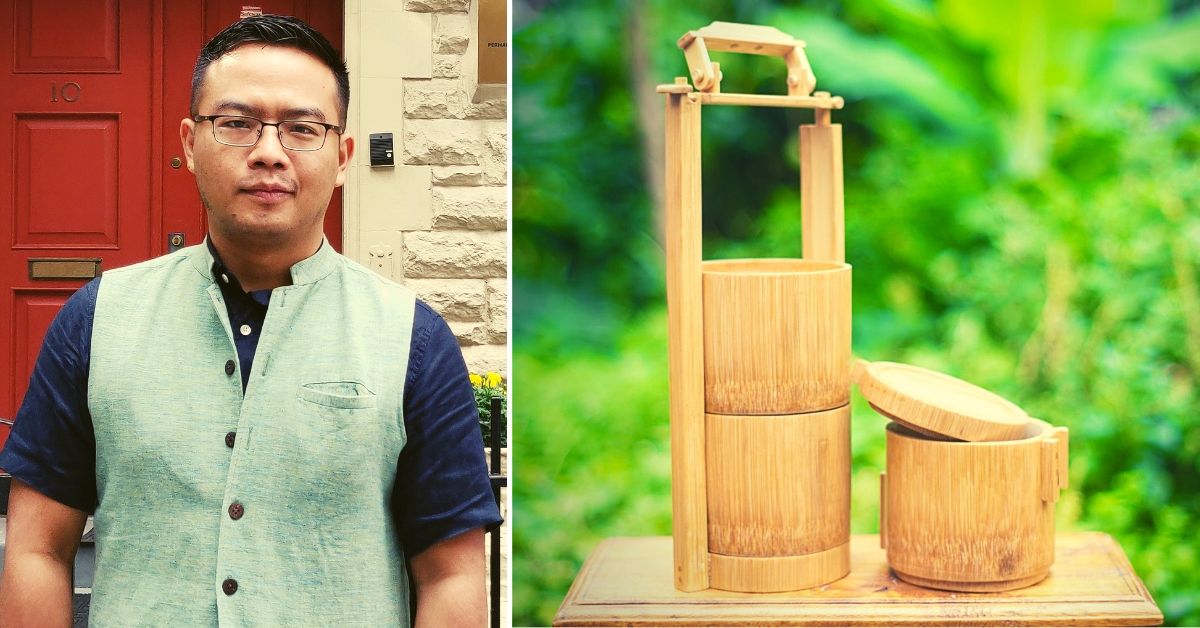Manipuri Startup Makes Unique Bamboo Tiffin Boxes That Last For 3 Years!
Super cool and sustainable, these bamboo tiffins can be used for storing both hot and cold food. We just bid goodbye to our plastic dabbas! #Sustainable #social-content-innovation

Ever since he was little, V Ginkhanpau has found true joy in the lap of nature. Venturing into the deep forests of Manipur, in search of bamboo shoots, wild fruits, and berries, comprise some of his fondest childhood memories. As does bamboo.
“Bamboo is a part and parcel of our daily lives here. We see it everywhere and in everything — it is used to create household items, fences, and even construct homes. I was 10 when I started pottering about with it, and soon, I was making bamboo walking sticks for the elders in my family and helping my parents cut it up for various purposes,” says 27- year-old Ginkhanpau.
So, after passing out of Class 12, Ginkhanpau didn’t have to think too hard about what he wanted to do next. He already knew what he was good at — using bamboo to create intricate handicraft items that are both beautiful and useful.
Today, Ginkhanpau along with his friend and business partner, Golan Suanzamung Naulak, runs a successful eco-friendly handicrafts venture named Zogam Bamboo Works (ZBW) in Lamka, a town in Manipur’s Churachandpur district.

From pens, water bottles to decorative pieces made of bamboo, the skilled craftsmen at Zogam create exquisite, eco-friendly and utilitarian products.
And their latest innovation, the bamboo tiffin box, recently went viral after IFS officer Sudha Ramen shared a clip uploaded by co-founder Golan, on Twitter.
Look at this Bamboo Tiffin carrier made by Zogam Bamboo at Churachandpur, Manipur. Beautiful and innovative design using local resources.
Use natural products – they are not just attractive, but also eco-friendly and it also supports many to have a livelihood. pic.twitter.com/7OFUpfvvWV— Sudha Ramen IFS ?? (@SudhaRamenIFS) July 6, 2020
The tweet meant to boost this innovation, and shed light on the potential of eco-friendly products especially those made in India. It also drew attention to how by investing in these products, one is not only contributing to save the environment but is also supporting homegrown local businesses.
“We are quite overwhelmed and happy with the response received online and are working day in, day out to meet the orders. This sort of attention given to local businesses like ours, really helps further our goal of environmental conservation and upliftment of marginalised communities,” says 33-year-old Golan, who also works in the development sector as a consultant and joined Ginkhanpau’s venture in 2017.
A Tiffin Box Made of Bamboo?

“Earlier, I used to make bamboo pens, decorative pieces, bottles, pen drives and various kitchen items, but I wanted to make something which was both unique and useful for people. Something that would look elegant and also be functional. That’s when I came up with the design for a tiffin set,” says Ginkhanpau.
Quite like a traditional steel tiffin dabba, his tiffin box is divided into three levels of storage, and comes with a placeholder that tightly locks every section preventing leakage. Till now, the makers have come up with two varieties of the tiffin box, one for storing dry food and another for wet food like gravies, curries and dals.
Talking about the longevity of the product, Ginkhanpau says, “These products are made to last at least for three years. They are made using good quality bamboo materials and can be used for storing both hot and cold food. Also, we are continuously improving upon the design and are planning to include an inner lining with copper and steel to better its durability.”
Commenting on the conundrum of using bamboo versus plastic, as pointed out by many netizens on Twitter, Golan adds, “Currently, bamboo products are not meant to ‘replace’ plastics or steel items. The idea behind this is to provide alternatives to the choices offered in the market. It is also about a behavioural and lifestyle change that we are thinking about. Certainly, we can use them for many purposes but not for all purposes, and this is where user discretion comes in.”
Starting a Business

Although skilled enough to make simple items out of bamboo, when he first started crafting, Ginkanphau still lacked formal training. In 2014, he joined a month-long course in bamboo handicrafts in Dehradun followed by another month at the Cane and Bamboo Technology Centre (CBTC), in Assam.
Following that, he started selling bamboo products from home to prepare and gather enough capital to start his own company. In a few months, he was finally successful and registered ZBW in the same year, as an MSME (Micro, Small and Medium Enterprises) unit.
In 2016, he even applied to enter the Guinness Book of World Records, carving a 22.1 ft-long pen crafted out of a single dragon bamboo. Although he wasn’t able to break the record, it is one of his most treasured creations.
Golan, on the other hand, received the Chevening Scholarship at the School of Oriental and African Studies (SOAS), University of London in 2015 and completed his post graduation in South Asian studies from there. His formal education further equipped him for grassroots level work in the development sector and upon returning home, he decided to join and support Ginkhanpau’s entrepreneurial dream that was fueling the growth of the community as well.
While Golan handles the business and marketing responsibilities of the startup, Ginkhanpau’s efforts are focused towards production and design. Owing to the viral video posted by Golan and then retweeted by IFS officer Sudha Ramen, ZBW has already received over 150 orders in a day.

“It’s a huge show of support and we are grateful for that. However, since each tiffin box is handmade, and we have limited manpower, it will take some time to cater to each and every one who has placed their order,” he says.
Although a small team of 5 people which keeps expanding by involving craftsmen and craftswomen from the community, depending on the flow of demands, ZBW is much more than a business. It is part of a larger movement in Northeast India, which focuses on promoting the region through local resources, skill development and examples of sustainable lifestyle.
Manipur-based Seiminlun was one of the first people to buy the bamboo tiffin, and is quite pleased with it. “As consumers, we also have a responsibility towards the environment and the first step to making a dent there is through adopting a sustainable lifestyle. This was the reason I made this purchase, and I am pleasantly surprised by the superior quality of the product. Not just the quality or craftsmanship, but the durability and functionality of the product is quite impressive. I am very satisfied and am recommending it to many of my friends and family,” he says.
Golan says that he is not alone in this movement that aims to bring a larger impact. “ Over the last few years, a number of enterprising young people have returned to their home states and started initiatives that harness locally available resources, innovative tech and designs. Being environment friendly, our work has enabled others in the community to see the potential of our traditional resources for business and providing employment. In these testing times, such businesses are considered by many to be worth pursuing as they are more resilient than jobs in metro cities.”

Like ZBW, many such small businesses have been impacted due to the pandemic situation. But, Golan believes the adversity has also created a fertile ground for opportunities, especially with a renewed focus on reviving rural economies through use of local resources.
“This is an opportunity for eco-friendly products like ours to scale up and increase our production, improve our designs and innovate further. We plan to purchase more machinery, train more staff and focus on raw bamboo production, so that we can come up with better designs and increase production as well. We are looking forward to a productive future,” says Golan.
The tiffin box meant for dry food is priced at Rs 599, while the one for wet food costs Rs 799. To know more, you can visit their Facebook page or contact the team at [email protected].
(Edited by Gayatri Mishra)
Like this story? Or have something to share?
Write to us: [email protected]
Connect with us on Facebook and Twitter

Similar Story

‘All For My Dad’s Memory’: This Hero Has Grown 12 Food Forests In The Heart of Mumbai
A tree lover since the age of 9, George Remedios quit his advertising job and founded ‘The Turning Tide’ to increase the forest cover in Mumbai. So far, he has planted 12 food forests with edible fruits and encourages people to grow their own food, even in limited spaces.
Read more >
If you found our stories insightful, informative, or even just enjoyable, we invite you to consider making a voluntary payment to support the work we do at The Better India. Your contribution helps us continue producing quality content that educates, inspires, and drives positive change.
Choose one of the payment options below for your contribution-
By paying for the stories you value, you directly contribute to sustaining our efforts focused on making a difference in the world. Together, let's ensure that impactful stories continue to be told and shared, enriching lives and communities alike.
Thank you for your support. Here are some frequently asked questions you might find helpful to know why you are contributing?


This story made me
-
97
-
121
-
89
-
167












